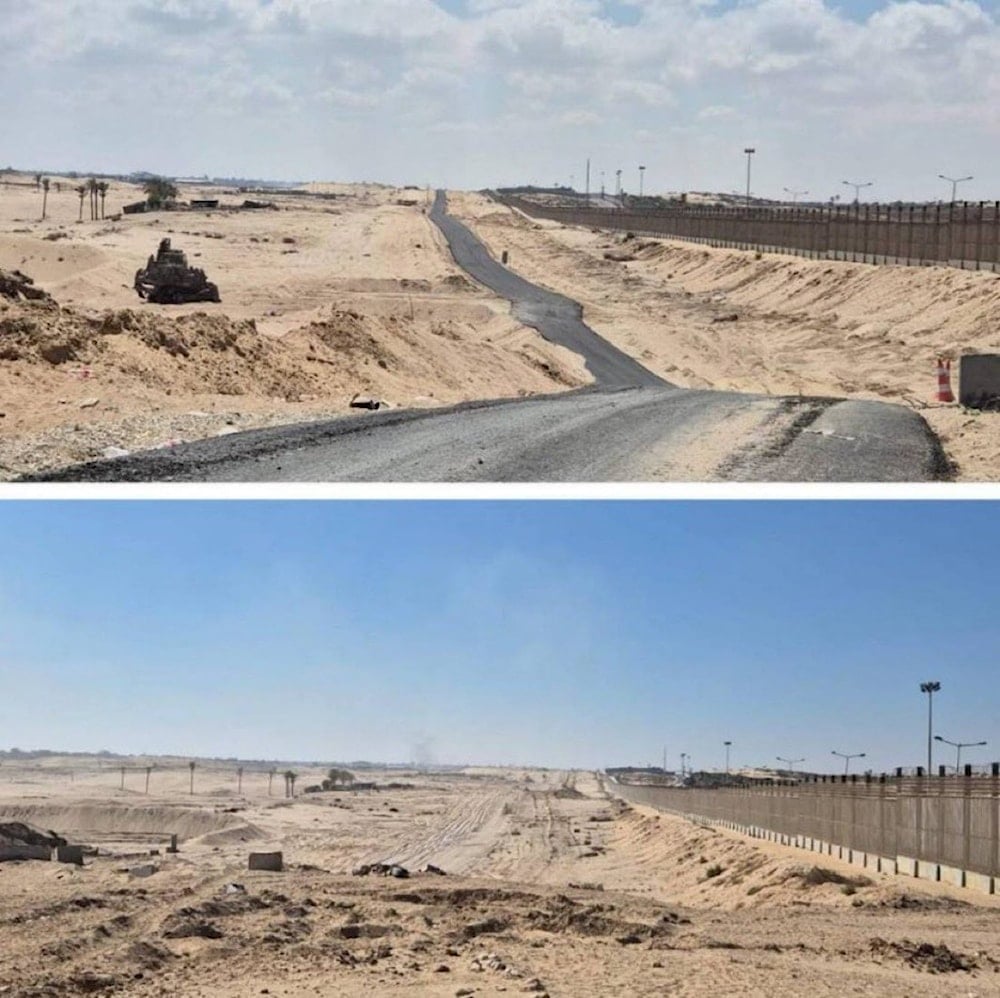Satellite images show 'Israel' paving Philadelphi Corridor: BBC
From August 26 to September 5, satellite images captured the fresh paving of a 6.4-kilometer stretch of the Corridor.
-

A photo circulated on social media shows the Philadelphi Corridor before and after it was paved by the Israeli occupation military
Israeli forces have been asphalting the key Philadelphi Corridor along Gaza's southern border, a move some analysts interpret as an indication that a full withdrawal from the territory is not imminent, BBC reported on Saturday.
This comes despite the White House saying that an Israeli-approved framework for a ceasefire deal, aimed at bridging gaps between Hamas and "Israel", includes the withdrawal of Israeli forces from all densely populated areas along the Philadelphi Corridor.
The Corridor has become a point of contention in ongoing negotiations for a ceasefire in Gaza and a prisoner exchange deal between the parties.
BBC Verify has examined satellite imagery, photos, and videos confirming the resurfacing of this road, which runs along the Gaza-Egypt border. From August 26 to September 5, satellite images captured the fresh paving of a 6.4-kilometer stretch of this road.
A video posted online on September 4 showed construction activity along the border fence, with heavy machinery laying new tarmac sufficient for two large vehicles to pass.
The Philadelphi corridor on the Gaza-Egypt border is being paved.
— 𝗡𝗶𝗼𝗵 𝗕𝗲𝗿𝗴 ♛ ✡︎ (@NiohBerg) September 5, 2024
Gazans and Egyptians are both shocked and appalled that Israel is building above ground and not below. Goes against their tunnel culture.
Israel now owns Philadelphi and will do so for the rest of time. pic.twitter.com/vOVuto86MB
The Philadelphi Corridor includes the Rafah border crossing with Egypt, Gaza’s only crossing not under direct Israeli control and crucial for aid delivery. It extends 12.6 kilometers from the Karem Abu Salem crossing to the Mediterranean Sea.
The occupation army is paving the #Philadelphi corridor for easy movement. Netanyahu does not want to withdraw from the corridor. pic.twitter.com/Cr6vjMkE9N
— Abo Obaida (@Abo_Obaida3) September 5, 2024
Although "Israel" and its settlers withdrew from the Gaza Strip in 2005, the Israeli occupation military invaded the Philadelphi Corridor on May 7 of this year, deploying tanks and armored personnel carriers, and began paving the road months later. Israeli forces have also taken control of the Rafah crossing and advanced north-west along the corridor and into the southern city of Rafah.
Over the past four months, occupation forces have conducted extensive destruction operations near the corridor, including air and artillery strikes, demolitions, and bulldozer operations. For instance, the village of al-Qarya al-Suwaydiya at the Mediterranean end of the border has been destroyed and now functions as an Israeli military base.
Dr. Andreas Krieg, a senior lecturer at King’s College London, said that "paving the road puts pressure on negotiators and mediators. The Israelis are trying to create a fait accompli."
"It also suggests that Israel is not going to withdraw entirely from the Gaza strip any time soon," he told BBC.
Krieg drew parallels with the so-called Netzarim Corridor, constructed by the Israeli military earlier this year in northern Gaza, noting that such infrastructure investments suggest a long-term Israeli presence.
"If you look at the investments made in the Netzarim Corridor, it's clear they have no intention of withdrawing anytime soon, they've got concrete barriers, forward operating bases with towers and walls - you don't build those if you're planning on withdrawing," he explained.
Israeli occupation Prime Minister Benjamin Netanyahu has described the Philadelphi Corridor as crucial for Hamas' operations and insists on maintaining a military presence there as part of any agreement.
Netanyahu claims that Hamas used tunnels beneath the Philadelphi Corridor for smuggling weapons and personnel before the October 7 events.
Meanwhile, retired Egyptian Major General Dr. Samir Faraj views the road paving as a form of "psychological warfare... paving the road is a media war, a war in which Israel sends a message to different parties that they will not leave."
Exclusive - Resistance source: Philadelphi main obstacle to ceasefire
On September 6, a high-ranking leader within the Palestinian Resistance told Al Mayadeen that the Philadelphi Corridor remains the key obstacle in achieving both a ceasefire agreement in the Gaza Strip and a prisoner exchange deal. This contentious area continues to be a critical point of negotiation, impeding progress toward a broader resolution.
The leader added that the Israeli occupation is adamant about not withdrawing from the Philadelphi Corridor during the first phase of the agreement, intending to postpone the withdrawal to the second phase.
He also noted that Hamas informed mediators of its categorical rejection of allowing occupation forces to remain in the area during the initial 42 days of the agreement.
He further revealed that mediators had presented proposals for the occupation to gradually withdraw from the Philadelphi Corridor during the first phase of the agreement. However, "Israel" rejected these proposals, maintaining its stance against an immediate or phased withdrawal.
Read more: Netanyahu's claims regarding Egypt aimed at justifying failure: Source

 4 Min Read
4 Min Read








